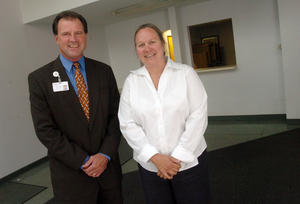State backs Washtenaw County push for federally-qualified health center
The state has thrown its support behind efforts by Packard Health and Washtenaw County to receive a federal designation that officials say would help improve health care access to a growing number of uninsured people within the county.
Gov. Jennifer Granholm recently signed a letter asking a federal agency to grant an exception to Washtenaw County to allow public health clinics to apply for status as a federally-qualified health center, or FQHC.
Clinics with the status as FQHCs receive higher reimbursement rates for Medicaid patients and are allowed to compete for additional grant funding. In the stimulus package, $11 billion was set aside over five years for FQHCs to develop organization capacity, add patients and enhance services.
Federally qualified health centers, also called Community Health Care Centers, were launched in 1965. The application process can take at least a year.

Douglas Edema, vice president of ambulatory and physician networks at Saint Joseph Mercy Health System and Kimberly Kratz, executive director of Packard Health, are shown in this file photo.
Six of the seven counties that touch Washtenaw County are either considered full county or partial county medically underserved populations.
Packard Health, at 3174 Packard Road, has prepared to apply to be a Community Health Care Center, but is waiting for word on whether the U.S. Health Resources and Services Administration will grant an exception to allow the application. For a clinic to apply, it must demonstrate it is located in a “medically underserved” area.
It’s a hard argument to make, said Kimberly Kratz, executive director of Packard Health. Washtenaw County has two large health providers in the University of Michigan and St. Joseph Mercy Hospital. It also has a number of smaller health clinics, including two of Packard Health's centers, in the county.
But, Kratz said, there also has been a growing strain on existing public health providers, especially on the eastern side of the county. Wait times have topped 90 days on average at some Washtenaw County clinics that serve the uninsured and underinsured, and clinics are straining to meet the demand, she said.
“There is a significant and rapidly growing segment of the community that can’t access health care,” Kratz said.
To receive the designation, a clinic must provide comprehensive primary and preventative care services - including dental and mental health care, must use a sliding scale payment system, be run by a board made up of a majority of patients, and follow specific performance and accountability requirements.
Packard Health officials say the clinic already meets most of the guidelines to receive the designation and has received support from a number of partners around the county, including both the University of Michigan and St. Joseph Mercy Hospital.
The extra funding that becomes available to Community Health Centers would require the clinic to make additional services available, such as dental services that are currently extremely limited to the uninsured in the county, Packard officials said. It could also increase the possibility of building a new public health clinic in Ypsilanti to make health services more geographically accessible to populations in the eastern portion of the county.
The state agrees. In the letter - signed by Granholm and Michigan Department of Community Health Director Janet Olszewski - the state requested the HRSA grant an exception in its guidelines for that federal designation.
“A higher percentage of Washtenaw County’s non-elderly population is estimated to be underinsured than for the state as a whole. Also, the Medicaid population within Washtenaw is increasing at a faster rate than [the] state’s Medicaid population,” Olszewski said in the letter. “This, combined with job losses related to the national recession, is creating conditions that are straining the health care resources available to the low-income and uninsured population of Washtenaw County.”
Developing a FQHC would “significantly improve access to comprehensive primary care for the county’s low income population,” the letter said.
Michigan has somewhat fewer FQHCs per 10,000 insured people than other parts of the nation, said Marianne Udow-Phillips, director of the Center for Healthcare Research & Transformation.
According to a report called "Cover Michigan" from the center, about 15 percent of Michigan residents living below the federal poverty guidelines have access to a federally-qualified health center, and 48 percent of federally-designated medically underserved areas lack an FQHC, ranking Michigan 34 in that measure of access to safety net providers.
This matters, Udow-Phillip said, because cuts made in the state budget for Medicaid reimbursement rates have made it increasingly difficult for health care providers to accept Medicaid patients and for those patients to find care.
“It’s makes it a challenge to pay for care, for doctors’ salaries. But it’s Packard’s mission and we get a lot of help,” Kratz said.
Udow-Phillips said she considered it highly unlikely, but not impossible, that HRSA would deny the governor’s request to consider Packard Health’s application.
“We are not considered a ‘medically underserved’ county as a whole. But Packard (Health) has been able to document a population that’s clearly underserved, which is likely why the governor signs a letter of support,” Udow-Phillips said. “This would be a great thing for the county.”
Tina Reed covers health and the environment for AnnArbor.com. You can reach her at tinareed@annarbor.com, call her at 734-623-2535 or find her on Twitter @TreedinAA.

